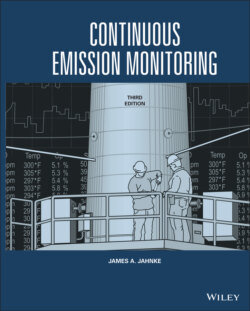Читать книгу Continuous Emission Monitoring - James A. Jahnke - Страница 39
40 CFR Part 70 – Title V Operating Permits
ОглавлениеCongress established the Title V Operating Permit Program under the 1990 Clean Air Act Amendments. Under the program, major sources are required to obtain operating permits, operate in compliance with the permit, and certify annually that they are in compliance with the permit requirements. Most permits are issued by state and local agencies following the requirements of 40 CFR Part 70. Federal permits can be issued following 40 CFR Part 71.
TABLE 2‐3 Summary of 40 CFR 62 Monitoring Requirements for Existing Units Not Covered by an Approved and Effective State or Tribal Plan
| Source Category | Part 62 Subpart | Affected Units | Effective Datea,b | CEM Requirements | CFR Monitoring Reference |
|---|---|---|---|---|---|
| Large municipal waste combustion units | FFF | > 250 tpd | Constructed before 9/20/94 | Opacity As per 40 CFR 60.8b Subpart Eb | 62.14105 62.14109 60.58b |
| Hospital/Medical/Infectious Waste Incinerator (HMIWI) | HHH | Large Medium Small Small Rural | Constructed before 12/1/08 | Options for SO2, NOx, CO, HCl, O2, D/F, PM CEMS, Bag leak detector | 62.14452 |
| Commercial and Industrial solid waste Incinerators (CISWI) | III | Combustion Units | Constructed before 11/30/99 | Bag leak detector if FF | 62.14690 |
| Small municipal waste combustion units | JJJ | >35 tpd < 250 tpd | Constructed before 8/30/99 4/6/10a | Opacity SO2, CO NOx (Class 1)b O2 or CO2 | 62.15170 62.15175 |
| Sewage sludge incineration units | LLL | Combustion units | Constructed before 10/04/10 | Bag leak detector if FF Options for SO2, NOx, CO, HCl, O2 or CO2, D/F | 62.15960 62.15980 62.16015 |
a Modification began before this date
b Units > 250 tpd capacity
States issue operating permits for both existing and new stationary sources.
An operating permit may include conditions that require the installation of CEM systems. States may prepare rules for existing sources that are more stringent than those promulgated by the federal agency (Kerstetter 1985). As a result, the stringency of state CEM rules may extend beyond those established for similar sources regulated under NSPS. Monitoring of gases such as HCl or volatile organic compounds may be required, or process cutoffs for excess emissions or real‐time telemetry may be required in the permit. Sources often agree to very stringent CEM requirements to expedite approval of the operating permit.
